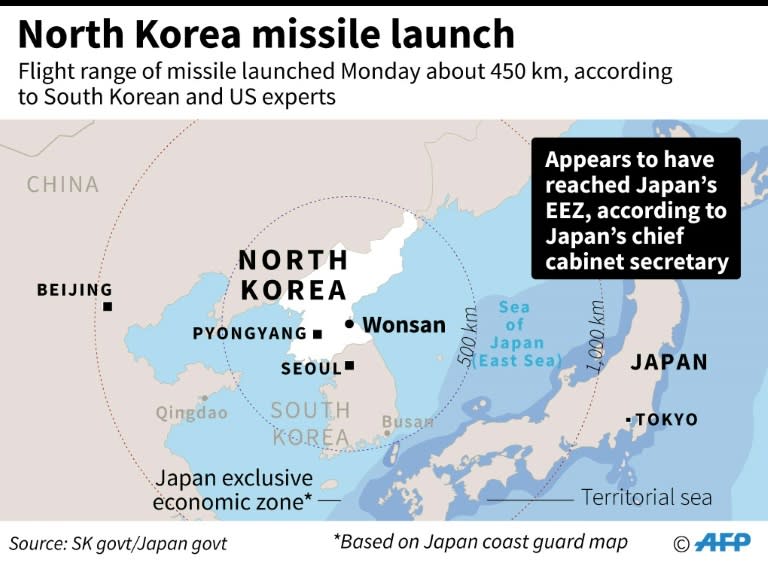North Korea test-fires missile in latest provocation
North Korea Monday test-fired a ballistic missile for the third time in less than three weeks, earning a rebuke from US President Donald Trump who said it showed "disrespect" for neighbouring China. The launch of the short-range projectile, which fell provocatively close to Japan, was the North's 12th ballistic missile test this year -- in defiance of UN sanctions warnings and US threats of possible military action. It went ahead despite tough talk from Trump, who promised last week at the G7 summit that the "big problem" of North Korea "will be solved". "North Korea has shown great disrespect for their neighbor, China, by shooting off yet another ballistic missile... but China is trying hard!" Trump said in a tweet. The US leader has urged China, the North's sole major ally and key trade partner, to do more to press Pyongyang to curb its missile and nuclear programmes. South Korea's military said the Scud-type missile travelled for 450 km (280 miles). Japan said it was estimated to have fallen into its exclusive economic zone, extending 200 nautical miles from the coast. Prime Minister Shinzo Abe swiftly condemned the test -- the second time this year that a North Korean missile has fallen close to its shores -- vowing concerted action with the US. "We will never tolerate North Korea's continued provocations that ignore repeated warnings by the international community," Abe told reporters. "As agreed during the G7 summit, the North Korean problem is the international community's top priority." - Conflict 'catastrophic' - The North has been stepping up efforts towards its ultimate goal -- developing an intercontinental ballistic missile (ICBM) that can deliver a nuclear warhead to the continental US. Despite Trump's strident warnings of possible military intervention, Secretary of Defense James Mattis said in an interview which aired Sunday before the launch that a war with North Korea would be "catastrophic". "The North Korean regime has hundreds of artillery cannons and rocket launchers within range of one of the most densely populated cities on Earth, which is the capital of South Korea," Mattis told CBS News. "This regime is a threat to the region, to Japan, to South Korea. And in the event of war, they would bring danger to China and to Russia as well. "But the bottom line is, it would be a catastrophic war if this turns into a combat, if we're not able to resolve this situation through diplomatic means." Mattis declined to say what kind of action from Pyongyang would constitute a "red line" for Washington, saying the administration needs "political manoeuvre room." The latest launch demonstrates the North's confidence and its determination to secure leverage in any future negotiations with the US, said Cho Han-Bum, analyst at the Korea Institute for National Unification. "Today's launch is the North's way of saying to the world, 'It wouldn't be easy to make us suspend our weapons programmes even if you manage to pressure me into negotiations'." - 'Direct challenge' - South Korea's new president Moon Jae-In ordered a meeting of the national security council to assess the launch, which came a day after Pyongyang said leader Kim Jong-Un had overseen a test of a new anti-aircraft weapons system. The South condemned the missile test as a "grave threat" and a challenge to Moon, who advocates dialogue with the North in a break from his conservative predecessors. "That the North repeated such provocations after the inauguration of our new leadership... is a direct challenge to our demand for peace and denuclearisation of the Korean peninsula," the foreign ministry said. Following North Korea's test-firing earlier this month of what analysts said was its longest-range rocket yet, the UN Security Council vowed to push all countries to tighten sanctions against Pyongyang. But China has made it clear that the push for talks -- and not more sanctions -- is its priority. On Monday it pleaded again for dialogue to calm regional tensions. "We hope that related parties can remain calm and restrained, ease the tension on the peninsula, and bring the peninsula issue into the right track of peaceful dialogue again," the foreign ministry said. The US has said it is willing to enter into talks only if the North halts its missile and nuclear tests.

 Yahoo Finance
Yahoo Finance 


